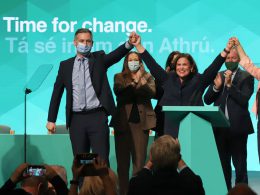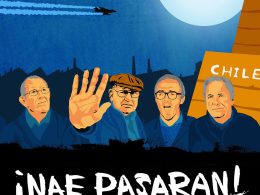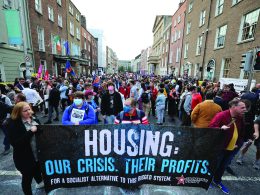By Conor Payne
The local and European elections saw successes for right-populist and far-right candidates. Part of this was the election of candidates who claimed to represent ‘rural Ireland’ in opposition to government and EU climate policy. Former RTE presenter Ciaran Mullooly was elected to Europe in Midlands North-West constituency, while his party Independent Ireland got 23 councillors elected, primarily in rural Ireland.
Mullooly claims that “a dogmatic green agenda is hell-bent on destroying farmers” and campaigned against the EU Nature Restoration Law and the EU Nitrates Directive, which regulates nitrate pollution in water, caused mainly by the use of fertiliser in agriculture. While some of these rural Independents are outright climate deniers, others will halfheartedly accept the reality of climate change while claiming that farmers are being unfairly targeted and blamed.
Government failure on climate
Far from being part of some extremist agenda, these laws, along with the Irish government’s Climate Action Plan, don’t even scratch the surface of addressing the climate and biodiversity emergency facing humanity. While ordinary farmers and rural people are not to blame for these crises, big agribusiness around the world and in Ireland have played a huge role in the destruction of our environment.
Agriculture is the biggest contributor to climate emissions in Ireland, at 38.5% and this is primarily attributed to methane from livestock and fertiliser use. The national dairy herd has risen every year since 2012. Unsustainable agricultural practices also threaten public health because of their effect on water quality and air quality and in Ireland’s extreme biodiversity crisis. The majority of Irish native plant species are in decline, with 70% of protected habitats negatively impacted by agricultural activity.
Class division in rural Ireland
However, people like Mullooly have clearly tapped a real anger in rural communities. Poverty rates are disproportionately high in these areas, and especially in the North-West. Many rural communities are suffering from depopulation, as a lack of economic opportunities causes many young people to leave, underinvestment and the closure of shops and key services. While right-wing politicians and others speak of ‘rural Ireland’ as a single undifferentiated mass, this covers up the huge inequality that exists in these communities.
Fifty-seven percent of family farms have an annual income of less than €20,000, while 14% have incomes of over €100,000 (primarily dairy farms). Beef and dairy dominate Irish agriculture and this in turn is dominated by big agribusiness, at the expense of small and medium farmers, workers and the environment. These are the interests which really stand behind the right-wing politicians and lobby groups who oppose climate action and claim to do so in the name of rural communities. The government likewise has absolutely no interest in challenging this setup, or in the kind of genuine just transition that could win support in rural communities for climate action.
For a just transition
We need a transformation of agriculture; ending the dominance of beef and dairy production, transitioning away from unsustainable practices while supporting the livelihoods of small and medium farms and workers in the agricultural sector. Small and medium farmers should be supported to move to sustainable practices and technologies, providing for training in regenerative farming practices and income support. In relation to the vital task of nature restoration or rewilding, there is no reason this should come at the expense of small and medium farmers; they could be paid a decent income to rewild land – a much less time-consuming and financially onerous task than farming.
The huge wealth in society should be used to provide the investment in rural communities that will allow them to be vibrant, and provide a future for young people. All of this is only possible if the rule of big agribusiness and the capitalist market generally is ended and their resources taken into public ownership. These vested interests will always put private profit before people and the planet. Democratic, socialist planning would allow for sustainable agriculture which genuinely meets the needs of farmers, consumers and workers.












